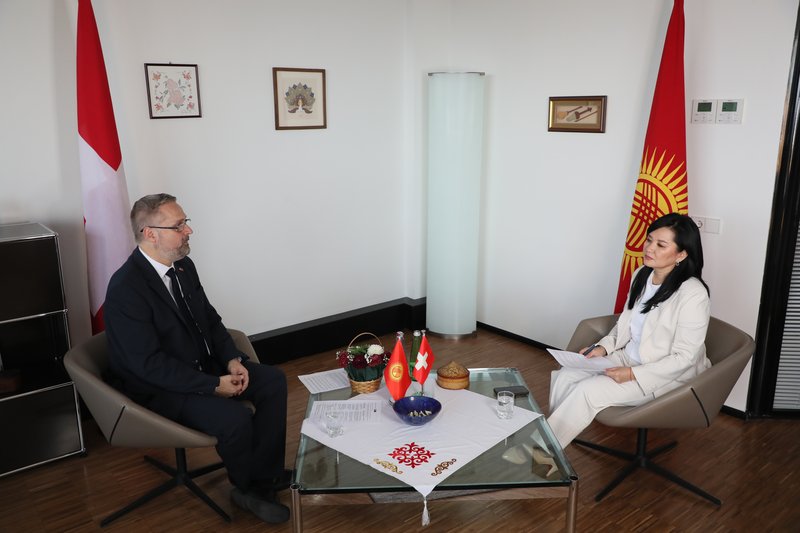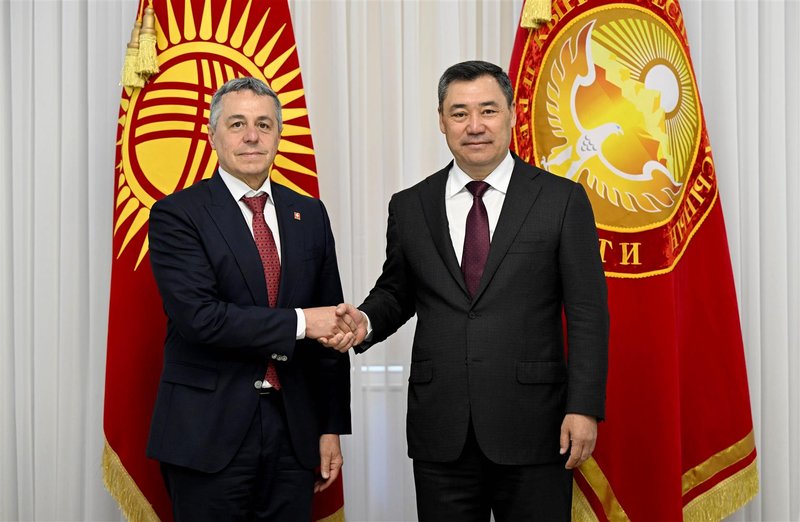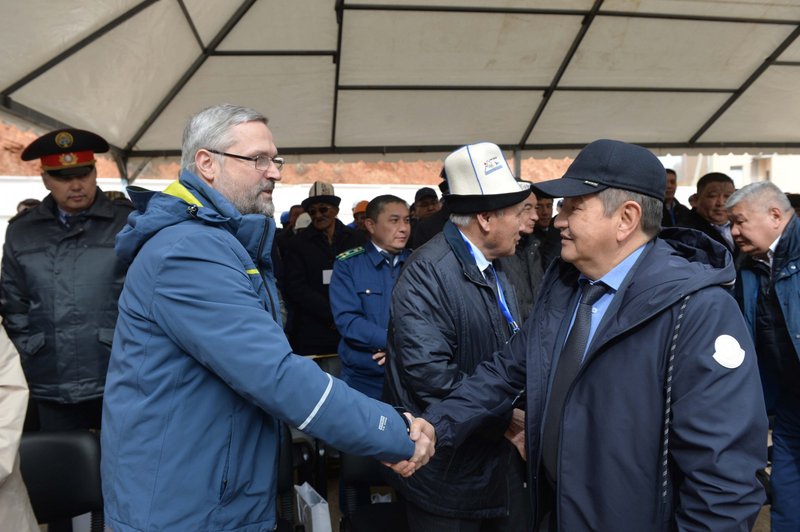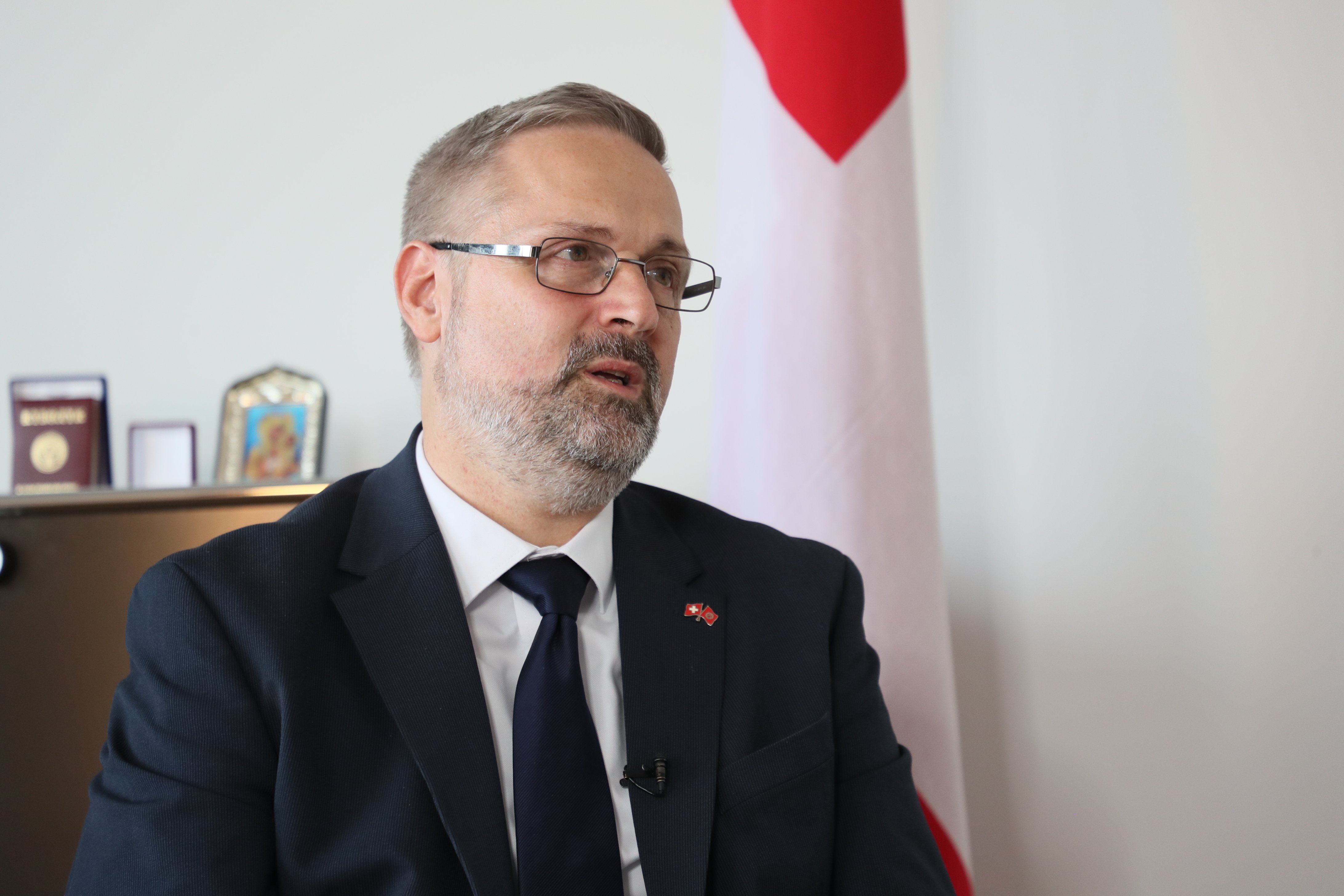This year we celebrate the 30 years of cooperation between Kyrgyzstan and Switzerland. Today we will talk with Ambassador of Switzerland to the Kyrgyz Republic Dr. Olivier Bangerter about cooperation between the two countries.
- Mr. Ambassador, can you tell us what are priority areas of cooperation, how did the priorities change over the years and what are the plans for future?
- You start with a big question. The priorities of the Swiss cooperation program for the moment are economic development (working with small and medium enterprises); water and infrastructure, including energy; preventing natural disasters; helping local governance and supporting to the health sector. The priorities should not change that much, but Switzerland is going to stop its collaboration on health because we have had a lot of success in this area. And now if we want to get better results, then we would need to put much more means than we have. Rather than do things half and not do them well, we will stop in two years. We have done a lot of interesting things on health. You may remember within the last year roughly 800’000 people (half men and half women) had a first check for non-communicable diseases (issues like diabetes, heart problems, etc.). This is obviously not only due to Switzerland but partly due to some of our programs.
Over the years, 3’500 small and medium enterprises have received Swiss support out of 13’000 registered. We don’t work with smallest companies; we work with the middle sized. Round half of these 3,500 had better access to international markets in textile, tourism, etc. It is quite an interesting result. We have also done a number of projects people know well in Kyrgyzstan. One of them is a renovation of the At-Bashy Hydropower plant in Naryn oblast. Now this plant has a life span that has been extended a lot. People tell me 50 years. You and me may not be here in 50 years to see how it works. But we know that it’s 20, 30, 40, 50 years maybe even longer. We are very happy with that. It was a big project. It took a lot of time and the result is very good.
We are also working with the Ministry of Emergency Situations and the World Food Programme on the issue of preventing and responding to natural disasters. Sadly, this year in Kyrgyzstan we have seen a lot of mudflows that cost a lot of lives and a lot of destroyed property. Sadly, it seems this area of cooperation is going to be even more needed. I will meet H.E. Minister Azhikeev to discuss the further collaboration that we have. I can’t tell you what is going to happen, it will take some time to have great projects coming up in this area. This year Switzerland also has suffered from mudflows, mostly in the southern regions of Switzerland. When the Swiss Foreign Minister Mr.Cassis was visiting Bishkek, three days before his visit, he was visiting his home region and people affected. So, when we work on that area it’s because it also touches us at home. And we realize the importance of working before and not just after the disasters.

What is going to change? I cannot tell you yet because I have a good reason not to tell you. The reason is that we have not yet defined our new cooperation program; that will be done next year. Last week in Bishkek we had colleagues from Switzerland, Uzbekistan, Tajikistan and all my colleagues from Bishkek and we started the evaluation what is currently happening in the programme. So, it is very early to say now. But our foreign minister told the public and H.E. the president said that Kyrgyzstan will remain a priority country for Switzerland. That means that we plan to continue our work at the same level, maybe we will change a little bit our accent. It needs to be discussed with the government. It was very good news and I was happy that he said it. Actually, I had no fear, but it’s always better when you hear it.
I have only one year left here in Kyrgyzstan, but I really want to use it to the full. I want to work on our bilateral relations and leave the relation better than I have found it. This is the role of an ambassador. And I want to enjoy everything that Kyrgyzstan can offer and there is a lot.
There are so many achievements. I’ve already mentioned a few ones and I’d like to tell you more. We have worked with the water service to support them in defining river basin plans - how you can use water in the basin of the River Chui, river Talas, etc. There is a huge number of water users’ association that have been created, who are managing the water at village and community level. You and me know very well that without water it is difficult to do agriculture. We estimate that a quarter of a million, 250’000, farmers have a better access to water and irrigation thanks to Swiss programs and cooperation with the Ministry of Natural resources, and now the Ministry of water, agriculture and food processing.
We also have worked in the economy area. I forgot to mention about one of the most successful projects ever of Switzerland in Kyrgyzstan, it is a company “Suit Bulak” (Dairy Spring trademark). You may find their cheeses in many shops of Bishkek with a Swiss flag on it because it was originally a project of the Swiss cooperation. It was then bought by an investor from Switzerland. It is something that works extremely well. Hundreds of farmers of the year have delivered their milk to the company, which provided a steady income to a lot of people. It’s not kind of a handout to poor people, it’s giving people who already are working the possibility to succeed. And I’m very proud of that.
I didn’t mention what we’ve done with the agency for local governance and with municipalities. Over the years, hundreds of thousands of people have had better access to their authorities at local level, for instance, through discussion of budget. The municipalities have been able to plan much better to work on waste collection, road construction through different Swiss projects. I’m not going into details, but it’s really about hundreds of thousands of people. That was only possible through excellent collaboration that we had with the agency of local governance.
We also have worked with, difficult to estimate how many exactly but we estimate over 600, NGOs and cultural events, so that they can provide services to different parts of the population. In terms of cultural events many people in Kyrgyzstan can have access to cultural events. All that is a little bit – just a tip of the iceberg, but there is a lot of achievements. It is nice that the 30th anniversary of collaboration allowed us to go into our archives and discover new things. If the readers want to discover more, they should go at our Instagram because we post about the results of the cooperation today and also in the past. I think this is important that we don’t simply do things, but reflect that a lot has been already achieved.
- How can you assess the level of cooperation between Kyrgyzstan and Switzerland? What can we focus on in cooperation?
- I don’t like the word “focus” for cooperation because I have cooperation in all sorts of different areas. I will give you a few examples. I think we need to continue having our friendship that is based on different elements, not just one. Development cooperation is obviously that we are going to continue. So far, we estimate that we have invested more than 520 million dollars in Kyrgyzstan since independence of the Kyrgyz Republic. So, that is one element. Another element is political exchanges. We had our Foreign Minister H.E. Mr. Cassis in Bishkek. In May we had another high-level visit from Switzerland, we went to visit Alai and Chon Alai districts. Recently the Second Vice-Speaker of the National Council of Switzerland was in Bishkek and he is planning to come back in one or two years. So, these kinds of exchanges will continue.

On picture: Swiss Minister of Foreign Affairs Mr.Ignazio Cassis was received by President of the Kyrgyz Republic Sadyr Zhaparov in July 2024.
We also support each other in United Nations and other international organizations. We regularly support each other. Switzerland was a candidate for the UN Security Council and we have been extremely well elected. It was 2 years ago, I’m absolutely certain that Kyrgyzstan has supported us and we have supported Kyrgyzstan [in other occasions] too. To other bids, I cannot tell you because it is not public, but I can tell you that we have a very close collaboration with the Ministry of Foreign Affairs on all these issues.
We also have a close cooperation with the Central Bank when it comes to the World Bank and the International Monetary Fund because we a part of the same voting group. The Voting group can be seen technical, but actually it is very simple. Two hundred countries in the world, they cannot all speak, so we group together. Kyrgyzstan and Switzerland share the same group. It allows all of us to have a better voice and be better heard. Switzerland and Kyrgyzstan cannot do it alone, but together we can.
- Switzerland has been rendering assistance to Kyrgyzstan in various spheres. What do you think what is the most successful project implemented jointly by Kyrgyzstan and Switzerland?
- That’s a difficult question because I have a number of answers. I think one is the most I’m proud of is the project done very early after independence to preserve Kyrgyz forests. I have nothing to do with it as it was long time ago. That was to work with the forestry service to make sure that they could set themselves for the new reality. When I go, for example, to see Arslanbob and its beautiful walnut forests, local people tell me that this project has helped a lot to preserve forests - a unique heritage. I’m very proud of this and I have nothing to do with it.
Now the things that I have seen myself. It was a great moment of personal pride to be at the Inauguration of the renovated At-Bashy Hydropower Plant. I was speaking right after H.E. Chairman of the Cabinet and the Minister of Energy. For an ambassador that happens only once in a career. When Swiss journalists ask me “Anything you have done in Kyrgyzstan that you have never done before”, I say – Inaugurating the hydro power plant! That happens not very often.

On picture: Swiss Ambassador Olivier Bangerter and Chairman of the Cabinet of Ministers Akylbek Zhaparov are shaking hands during the inauguration of the At-Bashy HPP
- At the end of 2023, the volume of trade turnover between our countries was about 1 billion US dollars, what can we do to increase the further growth of this figure?
- One billion is a lot of trade, but most of it is gold. That is totally public and it has been discussed in media. Most of it, the National Bank of the Kyrgyz Republic is selling gold on international markets through an institution in Switzerland and using the hard currency to do two very important things for the Kyrgyz economy. One is to make sure that the som keeps its value (there is always a fluctuation), so that som remains stable and it works very well. The other is to repay national debt of the Kyrgyz Republic. This is very important and I’m very happy that the National Bank chooses a Swiss financial institution to help them market the gold.
You mentioned that in 2022-2023 the trade was much lower, in 2021 – it was exactly at the same level. I think it will be roughly the same for 2024; we have a very stable trade relation, not as much as I would like, but it’s stable and it is already something. Why not as much as I would like because I think the distance between the two countries is problematic. If you want to export, for example honey or fruits or agricultural products from Switzerland to Kyrgyzstan, from one country to the other, then you need to have high value-added products because the cost of transportation increases the cost of the commodity. For instance, Switzerland will export a lot of pharmaceutical materials, for example medicine, and it will be the main staple of our exports and this is high value added so we can do it. For instance, a small producer of Swiss cheese, they could not do it without making the cheese absolutely impossible to pay. Even for myself I would not give that much. We have not found a solution yet on this logistical distance constraint.
There is a number of Swiss companies that are looking into the Kyrgyz market. Obviously, the Swiss Embassy will help them as much as we can. We are not a private company, but we are very happy to help them. This number [level of trade exchanges] is still not that I’d like it to be, but we are working on it and it’s part of the role of the embassy.
- The nature of Kyrgyzstan is similar to Switzerland, we even say that Kyrgyzstan is a second Switzerland. What can you tell about tourism potential of Kyrgyzstan and what should we do to be the second Switzerland?
- That’s a very interesting question. This is about similarities and differences between Kyrgyzstan and Switzerland. Your mountains are roughly twice as higher as ours. That is really an attractive thing. You have huge mountains: Khan-Tengri, Lenin Peak and many others. In Switzerland people can count the mountains with 4’000 meters, try to make a record and climb all of them. In Kyrgyzstan 4’000 meters is not that high. So, that is a real attraction. I’m not saying this as a joke, Kyrgyzstan really has a lot to offer in terms of mountains, culture and diversity. People in one oblast are not the same than in the other oblast. These things tourists can be really interested in. I think the potential is there.
One thing you must not do is repeat the same mistakes that we’ve done in Switzerland in 1960s. We were developing tourism very quickly and it damaged nature in some places. The nature is still one of big attractions for visitors coming to Switzerland and you don’t want to touch it, you want to preserve it. I think Kyrgyzstan has the opportunity to learn from these mistakes done in my country.
The potential is big! I think there is still something is missing. We have all actors that are concerned with tourism coming together. It’s not just a question of having more hotels or more flights, it’s a question that the whole ecosystem for tourism must work. So, let’s say a tourist comes to Manas airport, he must have an impression that Manas airport is very nice and it’s his first impression of Kyrgyzstan. He must find public transportation, he must have roads going to the visiting sites that are in good shape, all these things are being worked on, but I think we are not there yet completely.
The safety of tourists is very important. One of them is road safety. The criminality here is not an issue. I have lived in other countries and I can tell you that I feel very safe in Kyrgyzstan. But the road safety is an issue. And the other very big issue is the mountain rescue because if you have tourists who get hurt during skiing and paraplanning and they are not repatriated quickly, then the reputation of Kyrgyzstan is going to suffer. I’m not saying this is right or wrong, but that’s the way how the market works.
Also, Kyrgyzstan has a competition with other countries in this area. Wider in the region than in the Central Asia. For instance, Nepal. If you come from Switzerland, France or US and you want to find big mountains you can come to Kyrgyzstan or Nepal. That’s the competition. So, you need to have all actors in the tourism sector working together. It’s not just about the mountains, but everything around us is absolutely fabulous. The potential is there, Kyrgyzstan has a culture of hospitality and I enjoy it every time I go to regions. So, it must be translated. Tourism is not just the way to make money, but it is also the way to express the Kyrgyz culture and the hospitality is part of that.
Another element and a great advantage of Kyrgyzstan is that you can have a combination with other countries in the region. People don’t go to Uzbekistan to enjoy mountains, ride horses and spend good times in pristine nature, for that I would come to Kyrgyzstan. People go to Uzbekistan to visit Samarkand, Bukhara and other very historical places. I know many of my friends who would actually want to visit both countries in one go. This is something that the Kyrgyz tourist sector could explore offering the whole experience [in both countries] from Khiva, and the Caspian Sea to Karakol city and even further. Mountains, different fruits, hospitality, history at the side of the border and that would be I think very interesting for the country.
- You have been living in Kyrgyzstan for several years, you’ve been to regions and you might be familiar with our traditions. What traditions surprised you? Did you notice any differences between the Kyrgyz and the Swiss people?
- One thing that surprised me is that we think the same way on a lot of levels. Swiss people have Alps, you call it Jailoo here. It is still in our tradition that many people think that they have cows and in winter cows are down in the valley and in spring they go up to the Alp. People would make cheese there. Now less people in Switzerland do that now than in Kyrgyzstan. There are a lot of people in Jailoo in summer in Kyrgyzstan, but it is still part of our culture. That has some consequences, we both think the same way: we are people who like good work, working with our hands, we need to take decisions that sometimes are not easy ones, etc. I understand Kyrgyz people much more than before I came here. That was a very nice surprise.
People told me that it would happen and it happens - when you are a guest of honour, sometimes you receive a sheep’s head. I really liked it. The ears a bit less, but the eyes more. First of all, I like it because it’s an honour, and second, I actually like it. I think it is really fun to not stay on the easy things, but to discover the culture of the country in all of its diversity. For instance, I discovered new things and food in Arslanbob, that I haven’t found here in Bishkek. In Naryn everyone knows what is on beshbarmak. Something what surprised me, for example, horse intestines that I have never eaten before, but it is absolutely fabulous. What surprises me that we actually nearer than what I thought. It is 6’000 km distance between us, but because we are both mountain people, even not everyone in Kyrgyzstan and Switzerland lives in a mountain, anyway we have it in our head.
- What profession you would choose if you weren't an ambassador? What advice can you give to young people who would like to work in the diplomatic field?
- I’m not sure what to answer to the first question. I don’t know what else. I can tell you about my dream when I was at the university was to study more history, either to work in research, academy or to be a teacher in history. Now a lot of things have happened since then, maybe I’ve changed dreams a number of times.
Advice – if you want to become an ambassador, don’t do like me because my career is a bit strange. I’ve done many other things: working with youth, humanitarian organization. Actually, I came to the foreign ministry quite late in my career life. I’m happy that it worked out very well. But whenever I tell young people in Switzerland any type of advice, it is “get some professional training, get some experience if you want to work in diplomacy. Try either to study or work abroad for a few years and then try to work with the Ministry of Foreign Affairs right away as quickly as you can.” So, exactly that I have not done. I had a professional training, but I waited for a long before to go to the Foreign Affairs.
Another advice I usually give is to be ready to go to places, which are not the destinations where everyone wants to go. My previous position was Kabul in Afghanistan, when the war was still raging. A lot of people thought that they would not want to go. I had two of my best years in this position. It was an incredible team there; it was extremely interesting. We were making a difference for the Afghan people and I don’t regret going to that place. It was very unusual. On the contrary, it made me richer in terms of experience, I created friendships and it really made me much richer.
Interviewed by Nurzhan Kasmalieva
